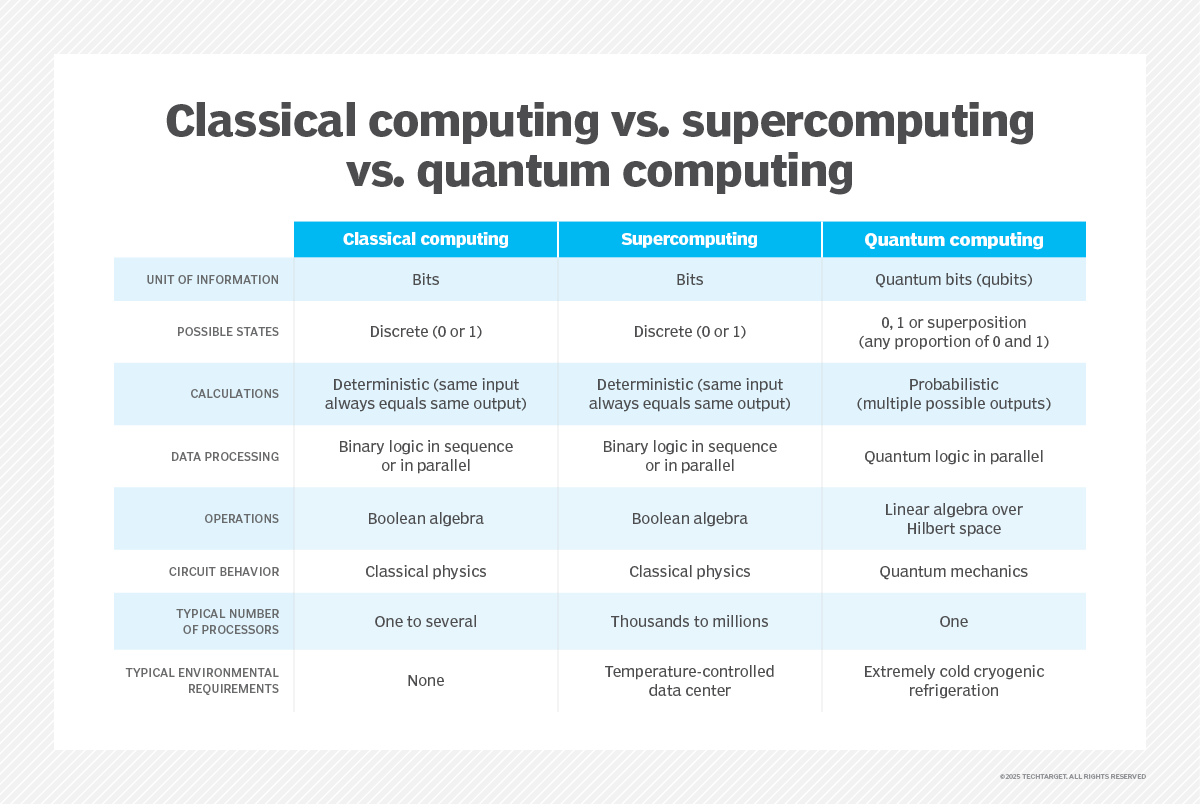As technology advances at an astonishing pace, the quest to understand the fundamentals of quantum computing captures the minds of physicists, engineers, and mathematicians alike. What if we could solve problems deemed infeasible for classical computers? This tantalizing inquiry presents an intellectually stimulating challenge: is quantum computing merely an extension of classical computing paradigms, or does it constitute an entirely new conceptual framework within the realm of physics?
To address this question, it is crucial first to delineate the foundational concepts of classical and quantum computing. Classical computers function based on bits, which represent binary states of 0s and 1s. These bits form the backbone of all classical algorithms, drawing upon Boolean algebra to execute calculations and logic operations. Fundamental to classical computation is the principle of determinism, where the output is predictably derived from a specific set of inputs via programming instructions.
Contrast this paradigm with quantum computing, wherein the elemental units of information are quantum bits, or qubits. A quintessential property of qubits is their ability to exist in a superposition of states. This means that a qubit can occupy multiple states simultaneously, a feature that allows quantum computers to process enormous amounts of information concurrently. The existence of superposition inherently challenges classical notions of computation, prompting the question: can traditional models adequately describe the full spectrum of computational possibilities offered by quantum mechanics?
Moreover, qubits exhibit another vital phenomenon known as entanglement. This phenomenon occurs when two or more qubits become interlinked in such a manner that the state of one qubit cannot be described independently of the state of another, regardless of the distance separating them. This non-local correlation contradicts classical intuition, which posits that information is confined within localized systems. Entanglement plays a pivotal role in enhancing computational capabilities, suggesting that the interconnectedness of qubits may yield solutions to complex problems with unprecedented efficiency.
Yet, the voyage into quantum computing is not without its obstacles. The ephemeral nature of qubits, which are incredibly susceptible to environmental interference, poses significant challenges in terms of coherence and stability. Quantum decoherence, the process by which quantum states degrade into classical states due to environmental interactions, represents a formidable barrier to the realization of practical quantum computations. As such, researchers grapple with the task of developing error-correcting codes and fault-tolerant quantum architectures to maintain qubit integrity over extended periods necessary for meaningful computations.
A potential challenge arises: could the inherent uncertainties and probabilistic nature of quantum mechanics itself hinder the deterministic requirements of traditional algorithms? This conundrum insinuates that quantum computers must not only operate under a different set of rules but also may require new paradigms of problem-solving. Reflecting on the work of physicists like Richard Feynman and David Deutsch, who advocated for the exploration of quantum systems to simulate physical processes, one might consider whether traditional methods of computation can effectively emulate the richness embedded within quantum behavior.
As researchers forge ahead in their exploration of quantum algorithms, it is vital to examine specific algorithms that highlight the distinctions between classical and quantum computational capabilities. One notable example is Shor’s algorithm, developed for integer factorization, which presents a polynomial-time solution for problems that are exponentially difficult for classical algorithms. The implications of such an algorithm challenge longstanding cryptographic conventions and raise ethical inquiries in areas such as cybersecurity. Similarly, Grover’s algorithm, which enables faster searches through unsorted databases, underscores how quantum approaches can revolutionize fields reliant on large data sets.
The fascination with quantum computing extends beyond its theoretical underpinnings; it also encompasses diverse applications across various domains. For instance, quantum simulations hold the potential to unravel complex molecular and chemical interactions, with profound implications for materials science and drug discovery. Quantum-enhanced machine learning could lead to significant advancements in artificial intelligence, while the optimization problems that plague supply chain management might find elegant solutions through quantum approaches.
Consequently, one might ponder the following playful question: In a hypothetical world where quantum computers are ubiquitous, could our understanding of intelligence itself be redefined by the superior processing capabilities they afford? As such, we confront an evolution in computational philosophy, one that necessitates a reconsideration of how we define intelligence, complexity, and inherently human problem-solving faculties.
Ultimately, while the exploration of quantum computing hinges heavily on physics, it transcends this singular domain, intersecting with computer science, mathematics, and even philosophy. As this pioneering field unfolds, it invites an interdisciplinary dialogue that challenges conventional wisdom, illuminates new paradigms of logic, and proffers potential solutions to existent and yet unimagined problems.
In conclusion, the question of whether quantum computing is limited to a physics-only perspective is underscored by the intricate interplay between determinism and probabilism, clarity and uncertainty. As we embark on this intellectual journey, we uncover not just the mechanics of qubits and superposition but also the profound implications these phenomena have on computation, knowledge, and our collective future.












